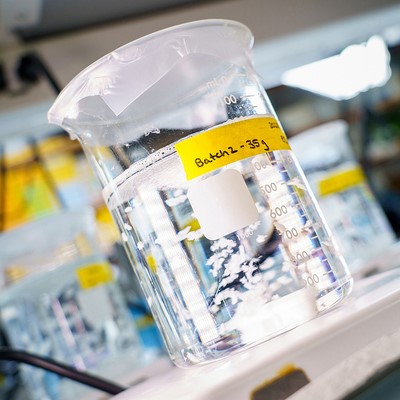
Efficient batch production is critical in European pharmaceuticals. This guide outlines key strategies, including process mapping, technology integration, Quality by Design principles, data analytics, supply chain optimization, regulatory compliance, lean manufacturing, employee training, energy efficiency, and continuous improvement. Implementing these practices ensures optimized processes, reduced costs, and enhanced manufacturing excellence.

Efficient and high-quality batch production is crucial for success in the European pharmaceutical industry. This short introduction explores key strategies for optimizing manufacturing processes, incorporating advanced technologies, ensuring regulatory compliance, and fostering a culture of continuous improvement. From process mapping to embracing Lean principles, this guide provides insights into streamlining operations to achieve manufacturing excellence in the dynamic landscape of European pharmaceuticals.
Optimizing batch production in European pharmaceutical manufacturing involves implementing strategies and best practices to enhance efficiency, reduce costs, and ensure product quality. Here are key steps to achieve optimization:
1. Process Mapping and Analysis:
In the initial phase of process mapping and analysis, a meticulous examination of the entire pharmaceutical manufacturing process is undertaken. This involves a systematic identification and mapping of each step within the batch production workflow. The aim is to create a comprehensive overview, allowing for a detailed evaluation of the efficiency and effectiveness at every stage of the process. Through this analytical approach, manufacturers gain valuable insights into potential areas for improvement, setting the foundation for targeted enhancements and optimization efforts.
2. Automation and Technology Integration:
The integration of automation and advanced technologies stands as a pivotal strategy in optimizing pharmaceutical batch production. This involves the implementation of state-of-the-art automation systems aimed at streamlining the manufacturing process. Additionally, the incorporation of process control systems is prioritized to minimize manual intervention and mitigate the risk of errors. An exploration of robotics and smart manufacturing solutions is undertaken, particularly targeting repetitive tasks, with the overarching goal of enhancing efficiency, precision, and overall operational effectiveness.
3. Quality by Design (QbD) Principles:
Embrace Quality by Design principles to enhance the overall quality of pharmaceutical products.
Design processes that inherently produce high-quality products, reducing the need for extensive testing and rework.
4. Data Analytics and Monitoring:
The integration of real-time monitoring and analytics tools is pivotal for optimizing pharmaceutical manufacturing processes. This involves the implementation of systems to track key performance indicators (KPIs) in real-time. Leveraging data analytics, manufacturers can identify patterns, detect deviations, and strategically optimize processes for continuous improvement. By harnessing the power of data, companies enhance their ability to make informed decisions and drive ongoing efficiencies in the dynamic landscape of pharmaceutical production.
5. Supply Chain Optimization:
Supply chain optimization is paramount in ensuring the seamless flow of raw materials and components for pharmaceutical manufacturing. Manufacturers prioritize the establishment of a reliable and efficient supply chain by implementing strategies to minimize lead times and mitigate the risk of disruptions. Collaborative efforts with suppliers are emphasized, fostering enhanced communication and responsiveness. Through these measures, companies aim to fortify their supply chains, ensuring a robust and resilient foundation for consistent and uninterrupted production.
6. Regulatory Compliance:
Maintaining stringent regulatory compliance is a cornerstone in European pharmaceutical manufacturing. This involves staying abreast of evolving industry regulations and standards. Manufacturers implement comprehensive systems and procedures to ensure adherence to Good Manufacturing Practice (GMP) regulations. Regular audits are conducted to proactively identify and address any potential compliance issues, ensuring that the manufacturing processes align with the highest quality and safety standards set by regulatory authorities.
7. Lean Manufacturing Principles:
Embracing lean manufacturing principles is key to enhancing efficiency and reducing costs in pharmaceutical production. This strategy involves the systematic elimination of waste and the improvement of overall operational efficiency. Additionally, the implementation of the 5S methodology organizes the workspace systematically, further enhancing productivity. By incorporating these lean principles, manufacturers optimize their processes, streamline workflows, and cultivate a culture of continuous improvement, ultimately bolstering the effectiveness of pharmaceutical batch production.
8. Employee Training and Engagement:
Prioritizing employee training and engagement is pivotal in optimizing pharmaceutical manufacturing. Companies invest in comprehensive training programs to ensure that employees stay well-versed in the latest technologies and processes. Simultaneously, fostering a culture of continuous improvement and employee engagement becomes a cornerstone for driving innovation and efficiency. By empowering employees with the necessary skills and fostering a collaborative and innovative environment, manufacturers enhance their workforce's capability to adapt to evolving industry demands and contribute to operational excellence.
9. Energy Efficiency and Sustainability:
Addressing energy efficiency and sustainability is integral to responsible pharmaceutical manufacturing. Manufacturers undertake evaluations of energy consumption, implementing measures to enhance efficiency. Concurrently, sustainable practices are integrated to minimize environmental impact and align with corporate social responsibility goals. By prioritizing energy-conscious initiatives and sustainable practices, companies not only contribute to environmental preservation but also uphold ethical standards, fostering a positive societal and environmental impact within the pharmaceutical industry.
10. Continuous Improvement and Feedback Loop:
Cultivating a culture of continuous improvement is a cornerstone in pharmaceutical manufacturing. This involves establishing regular feedback loops and encouraging employees to actively contribute suggestions for process enhancement and efficiency improvements. By fostering an environment that values ongoing refinement, companies create a dynamic feedback loop, ensuring that employees are engaged in the pursuit of innovation and operational excellence. This commitment to continuous improvement ultimately strengthens the adaptability and competitiveness of pharmaceutical manufacturing processes.
By implementing these strategies, European pharmaceutical manufacturers can optimize batch production, reduce costs, ensure regulatory compliance, and enhance overall manufacturing excellence.
In conclusion, adopting a holistic approach to optimize batch production in European pharmaceutical manufacturing involves integrating advanced technologies, ensuring regulatory compliance, and fostering a culture of continuous improvement. By implementing these strategies, manufacturers can achieve enhanced efficiency, reduced costs, and elevated overall manufacturing excellence in this dynamic industry landscape.